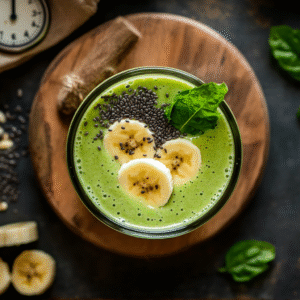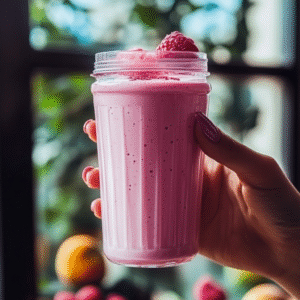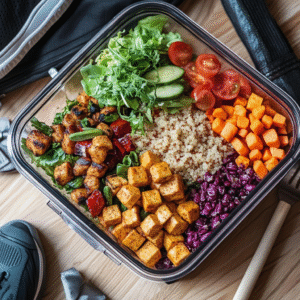1. Introduction: Powering Your Plant-Based Performance
Vegan Fitness Fuel Pre- and Post-Workout Meal Ideas are more than recipes—they’re a framework to maximize athletic performance, speed recovery, and sustain energy on a wholly plant-based diet. Athletes require precise macronutrient timing and balance: carbohydrates to top up glycogen stores, protein to repair and build muscle, and healthy fats to support hormone production and satiety. Contrary to myths about protein scarcity, rigorous reviews show that “an athlete can follow a (more) vegan diet without detriment” to performance or recovery PMC. By strategically choosing whole-food ingredients and minimally processed protein sources, you’ll harness the anti-inflammatory benefits of plant phytochemicals, optimize nutrient absorption, and avoid common pitfalls—like excess sodium or refined oils—that often lurk in ultra-processed vegan products, as noted by the Physicians Committee for Responsible Medicine.
In this comprehensive guide, you will discover:
The science behind pre- vs. post-workout fueling on a vegan regimen.
Five high-impact pre-workout meal ideas to energize every session.
Five recovery-focused post-workout meals to rebuild and replenish.
Timing recommendations, macronutrient ratios, and hydration strategies grounded in sports nutrition guidelines.
Practical meal prep tips, sample day plans, and advanced supplementation advice.
Armed with these Vegan Fitness Fuel Pre- strategies, you’ll train harder, recover faster, and maintain peak vitality—plant-powered, performance-driven.
2. Understanding Vegan Fuel: Pre- vs. Post-Workout Essentials
2.1 Pre-Workout: Maximizing Energy Reserves
The goal of pre-workout meals is to top off muscle and liver glycogen, provide steady blood glucose, and prevent hunger pangs mid-session. The American College of Sports Medicine recommends 5–10 g/kg body weight of carbohydrates daily for athletes, with a smaller 1–4 g/kg carb-focused snack 1–4 hours before exercise to “optimize performance” Physicians Committee for Responsible Medicine. Focus on low-fiber, moderate-glycemic-index carbs—like cooked oats, white potatoes, or fruit—to ensure rapid digestion without gastrointestinal distress. Including 10–20 g of complete plant protein (e.g., soy yogurt, pea protein shake) stimulates muscle protein synthesis early, priming recovery pathways even before you finish your warm-up.
2.2 Post-Workout: Accelerating Recovery
Post-workout nutrition centers on the “anabolic window” 30–60 minutes after training, where muscles are most receptive to nutrients. Aim for a 3:1 or 4:1 carb-to-protein ratio—20–40 g protein paired with 60–80 g carbs—to rapidly replenish glycogen and repair muscle fibers Allrecipes. Whole-food examples include a quinoa-tempeh bowl drizzled with tahini, or a smoothie of banana, mixed berries, hemp seeds, and plant-based protein powder. Research indicates plant proteins, when varied (lentils, soy, oats), match animal sources in supporting muscle repair and reducing inflammation Veloforte.
By distinguishing your pre- and post-workout goals—energy supply versus recovery support—you create a seamless nutrient pipeline that underpins every training session and workout.
3. Top 5 Pre-Workout Meal Ideas
3.1 Oatmeal Power Bowl
Combine 1 cup cooked oats with ½ mashed banana, 1 Tbsp almond butter, and a sprinkle of chia seeds. Oats provide slow-release carbs and beta-glucan fiber, banana adds quick glucose, and almond butter offers healthy fats and plant protein.
3.2 Sweet Potato & Black Bean Toast
Slice and roast sweet potato rounds; top with black beans cooked in cumin and chili, then avocado slices. Sweet potato delivers complex carbs and antioxidants; beans supply complete protein when paired with grains (toast); avocado adds monounsaturated fats for sustained energy.
3.3 Green Smoothie with Vegan Protein
Blend 1 cup spinach, 1 cup soy milk, ½ cup pineapple, 1 scoop pea protein, and 1 Tbsp ground flaxseed. This liquid snack is easy to digest, rich in carbs, and delivers 20+ g protein pre-session.
3.4 Chickpea Wrap
Fill a whole-grain tortilla with smashed chickpeas, hummus, shredded carrots, and greens. Chickpeas contribute 7 g protein per ½ cup; whole grains add fiber and B vitamins to support energy metabolism.
3.5 Rice Cake Stack
Layer two rice cakes with 2 Tbsp peanut butter, sliced strawberries, and a drizzle of maple syrup. Rice cakes are a fast-digesting carb base; peanut butter supplies fat and protein; fruit adds antioxidants.

4. Top 5 Post-Workout Meal Ideas
4.1 Quinoa & Tempeh Power Bowl
Cook 1 cup quinoa, top with ½ cup cubed tempeh sautéed in tamari, steamed broccoli, and sliced almonds. Quinoa offers all nine essential amino acids; tempeh and almonds add additional protein and healthy fats; broccoli restores micronutrients.
4.2 Berry & Soy Protein Smoothie
Blend 1 cup frozen mixed berries, 1 cup unsweetened fortified soy milk, 1 scoop vegan protein powder, and 1 Tbsp chia seeds. Berries replenish glycogen rapidly; soy milk provides 7–10 g protein per cup; chia seeds support omega-3 intake.
4.3 Lentil Shepherd’s Pie
Use cooked lentils in a savory mushroom gravy base, topped with mashed cauliflower. Lentils deliver 18 g protein per cup; cauliflower mash cuts carbs while adding fiber and vitamin C.
4.4 Peanut Butter Banana Oats
Combine ½ cup overnight oats, 1 Tbsp peanut butter, 1 sliced banana, and plant-milk splash. This dish delivers a 3:1 carb-to-protein ratio and important potassium for muscle cramp prevention.
4.5 Tofu & Veggie Stir-Fry
Sauté firm tofu cubes, mixed peppers, snap peas, and carrots; serve over brown rice. Tofu offers complete protein; rainbow veggies supply antioxidants to reduce exercise-induced oxidative stress PMC.

5. Macronutrient Ratios & Timing Strategies
Balancing macronutrients around workouts is crucial. Aim for 1.2–2.0 g/kg body weight protein daily, distributed evenly across meals to maximize muscle protein synthesis PMC. Carbohydrate needs vary by intensity: endurance athletes may require up to 10 g/kg, while strength athletes often function on 5–7 g/kg. Schedule larger mixed meals 2–3 hours pre-exercise to allow digestion; consume quick-digesting snacks (fruit, rice cakes) 30–60 minutes before. Post-session, consume recovery meals within 45 minutes—close the gap with a 200–300 kcal snack if full meals aren’t possible immediately.
6. Hydration & Electrolyte Balance
During exercise, aim for 0.4–0.8 L/hour of fluid intake, adjusting for sweat rate. Post-workout, replace 150% of fluid losses (weigh yourself pre/post). Incorporate electrolytes—sodium (300–500 mg), potassium (200–300 mg), magnesium (50–100 mg)—via coconut water, low-sodium vegetable juice, or homemade electrolyte drinks (water, maple syrup, salt, citrus) to restore cellular function and prevent cramping.
7. Meal Prep & Batch-Cooking Tips
Dedicate 1–2 hours weekly to batch-cook staples: grains (brown rice, quinoa), legumes (chickpeas, lentils), tofu/tempeh marinated in variety of sauces, roasted vegetables, and prepared smoothie packs (freeze fruit/spinach in bags). Portion into glass containers labeled with macros and reheating instructions. This “set-and-forget” system aligns with our Vegan Meal Prep: Stress-Free Plan, ensuring consistent access to performance-focused meals without daily cooking.
8. Advanced Supplementation & Natural Boosters
Consider supplementing with:
Branched-Chain Amino Acids (BCAAs): May reduce muscle soreness when taken pre/post-exercise.
Creatine Monohydrate: Supports ATP regeneration and strength gains; vegan-friendly powders derived from synthetic sources.
Beta-Alanine: Enhances buffering capacity to delay fatigue.
Beetroot Juice: Dietary nitrates improve blood flow and endurance The Game Changers.
Turmeric & Ginger: Anti-inflammatory effects when consumed as tea or capsule supports recovery.
9. Sample Day Meal Plan for Active Vegans
Breakfast (7 AM): Tofu scramble with spinach, bell peppers, and sweet potato hash—provides 25 g protein, 60 g carbs.
Snack (10 AM): Green smoothie: soy milk, banana, kale, pea protein (20 g protein).
Lunch (1 PM): Chickpea wrap: whole-grain tortilla, smashed chickpeas, hummus, veggies (18 g protein).
Pre-Workout Snack (4 PM): Rice cakes with almond butter and jam (6 g protein, 40 g carbs).
Workout (5 PM)
Post-Workout (6 PM): Berry & tofu smoothie bowl with granola (25 g protein, 70 g carbs).
Dinner (8 PM): Lentil shepherd’s pie (18 g protein, 60 g carbs).
Evening Snack (10 PM): Chia pudding with almond milk and berries (10 g protein, 30 g carbs).

10. Frequently Asked Questions
Q1: Can I build and maintain muscle on a vegan diet?
Yes. Research shows that varied plant proteins—soy, pea, lentils, and grains—can support muscle protein synthesis on par with animal sources when total intake is ≥1.6 g/kg body weight per day . Aim to include a complete protein (soy, quinoa, or a protein blend) at each meal, especially in your post-workout recovery.
Q2: How much protein should I consume pre- and post-workout?
Pre-workout: 10–20 g of protein paired with 30–60 g of carbohydrates 1–4 hours before exercise to stabilize blood sugar and prime muscles.
Post-workout: 20–40 g of protein with 60–80 g of carbohydrates within 30–60 minutes after training to maximize glycogen repletion and muscle repair .
Q3: What’s the ideal timing for these meals?
Pre-workout meals should be eaten 1–4 hours before training, allowing for digestion and steady energy release.
Quick pre-session snacks (rice cakes, fruit) are best 30–60 minutes before high-intensity workouts.
Post-workout nutrition is most effective within the first hour after exercise, closing the “anabolic window” for nutrient uptake.
Q4: Which supplements are most helpful for vegan athletes?
Key supplements include:
Creatine Monohydrate (3–5 g/day) for strength and power gains
BCAAs or EAAs during or after workouts to reduce muscle soreness
Beta-Alanine (2–5 g/day) to buffer lactic acid
Beetroot Juice for nitrates that enhance blood flow and endurance
Always prioritize whole-food sources first and consult a healthcare professional when adding supplements.
Q5: How can I prevent gastrointestinal discomfort from high-fiber pre-workout meals?
Choose lower-fiber, moderate-glycemic carbs (white rice, peeled potatoes, fruit) in the 30–60 minutes before exercise. Save high-fiber options (oats, legumes) for 2–3 hours pre-session or in your post-workout recovery meals, when digestion is less likely to impair performance.
For the women who want a holistic plant-powered lifestyle, this program offers tailored nutrition guidance, self-care routines, and lifestyle tips designed just for vegan women. Embrace a healthier, happier you—inside and out.
Learn more about this journey.
11. Travel-Friendly Fuel: Portable Pre- & Post-Workout Snacks
11.1 DIY Energy Bites & Protein Bars
When you’re on the road or between meetings, having Vegan Fitness Fuel Pre- in a grab-and-go form ensures you never miss your nutrient window. Prepare no-bake energy bites by blending dates, oats, almond butter, pea protein powder, and a pinch of salt; roll into 1-inch balls and coat with shredded coconut or cocoa powder. Store in a small mason jar or reusable silicone pouch—each bite offers ~5 g protein, 15 g carbs, and healthy fats to stabilize blood sugar before training. For a more substantial snack, bake homemade protein bars by combining chickpea flour, mashed bananas, rolled oats, and hemp seeds; cut into bars and wrap individually for post-session recovery that travels well.
11.2 Hydration & Electrolyte Packs
Maintaining electrolyte balance is critical when you can’t reach a water fountain or smoothie bar. Pre-portion homemade electrolyte powder—mix sea salt, potassium chloride (“Low Sodium Salt”), and a pinch of magnesium citrate—into small zip-lock bags. Add one sachet to 16 oz of water and a squeeze of citrus after long flights or intense workouts. For convenience, keep reusable stainless-steel bottles filled with coconut water concentrate or plant-based electrolyte drink mix in your gym bag. This strategy ensures you’re never dehydrated on the go and supports muscle function wherever you train.
12. Budget-Friendly Vegan Fitness Fuel
12.1 Bulk Staples & Economical Protein Sources
Elite nutrition doesn’t have to break the bank. Buying dried beans, lentils, and brown rice in bulk dramatically lowers cost per serving—lentils can provide 9 g protein for under $0.30 per half-cup cooked. Incorporate budget protein sources like tofu (≈10 g protein for $0.50), chickpeas (7 g protein for $0.20), and peanut butter (8 g protein for $0.10 per tablespoon) into meals. Stretch these ingredients into multiple dishes—save half a batch of spiced lentil stew for post-workout bowls—and rotate flavors with inexpensive spices (cumin, smoked paprika) to prevent taste fatigue.
12.2 Batch-Cooking Cheap Versatile Meals
A single $10 bag of split peas can yield 10 cups of split-pea soup, offering 8 g protein per cooked half-cup and enough calories to fill five meal containers. Likewise, cook large pots of brown rice and beans to form the backbone of burrito bowls, stir-fries, and grain salads. Portion into reusable containers labeled with meal type and reheating instructions. This method reduces impulse takeout—often $8–$12 per meal—and guarantees consistent macro ratios that align with your Vegan Fitness Fuel Pre- and post-workout targets.
13. Seasonal & Local Ingredient Adaptations
13.1 Summer Fruit-Forward Pre-Workout Blends
Leverage peak-season produce to maximize nutrient density and flavor. In summer months, blend watermelon—rich in L-citrulline for vasodilation—with frozen berries, a handful of spinach, and a scoop of rice protein for a hydrating, nitrate-packed pre-workout smoothie. Mix-ins like fresh mint or cucumber slices add cooling effects and aid digestion, perfect for outdoor training sessions when heat stress is a concern.
13.2 Winter Root-Vegetable Recovery Stews
As temperatures drop, swap cold drinks for warm, savory stews that support recovery. Roast cubes of sweet potato, parsnip, and beetroot, then simmer with lentils, kale, and ginger in vegetable broth until tender. This bowl delivers complex carbs, fiber, 18 g protein per serving, and anti-inflammatory phytonutrients that soothe muscle soreness and boost circulation—all from locally sourced winter harvests.
14. Tracking Progress & Adaptive Fueling
14.1 Journaling Intake & Performance Metrics
Quantifying results accelerates progress. Keep a simple training and nutrition journal—note pre- and post-workout meals, energy levels during exercise (scale 1–10), and recovery indicators (soreness, sleep quality). After two weeks, analyze patterns: does your oatmeal power bowl fuel long runs better than the chickpea wrap? Use these insights to fine-tune macro ratios and meal timing.
14.2 Adjusting Macronutrients Based on Feedback
No two athletes respond identically to the same meal. If you experience mid-session fatigue, gradually increase pre-workout carbs by 10–15 g or shift from low- to moderate-GI sources. If muscle recovery stalls, boost post-workout protein by 5 g increments or include a plant-based BCAA supplement. Regularly revisit and revise your Vegan Fitness Fuel Pre- and post-workout plans based on your performance data, ensuring your nutrition evolves with your training demands.
15. Conclusion: Fuel, Perform, Recover, Repeat
Implementing these Vegan Fitness Fuel Pre- and post-workout meal ideas empowers you to train at your peak while honoring plant-based ethics. Focus on nutrient timing, balanced macros, and whole-food sources—augmented by strategic supplements and hydration protocols—to optimize performance and recovery. Start with one new recipe per week, track your energy and markers (strength gains, recovery speed), and adjust portions or macros as needed.